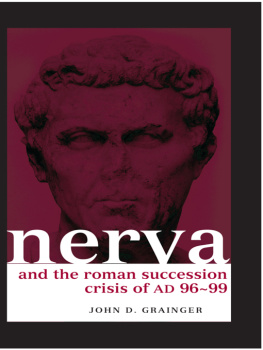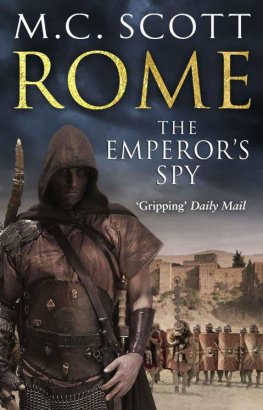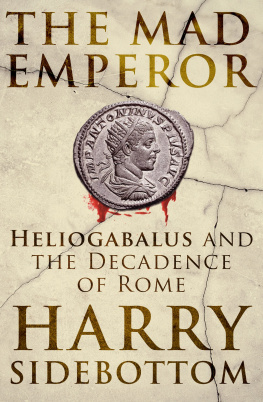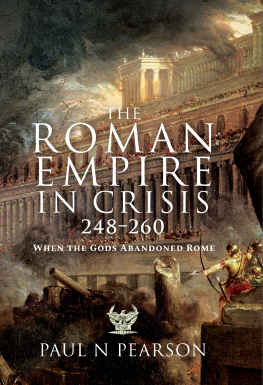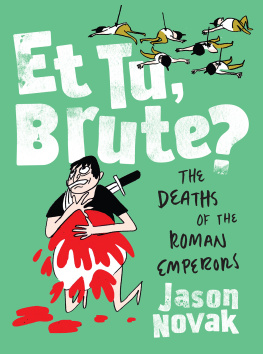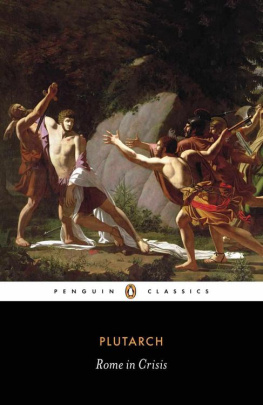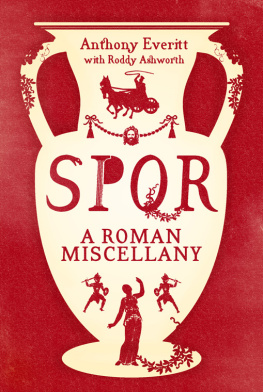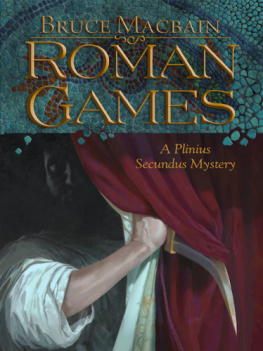ILLUSTRATIONS
PLATES
TABLES
MAPS
ABBREVIATIONS
| AE | Anne pigraphique |
| ANRW | Aufstieg und Niedergang der Rmischen Welt |
| BAR | British Archaeological Reports |
| Bennett, Trajan | J. Bennett, Trajan, Optimus Princeps, a Life and Times , London, 1998 |
| Birley, Fasti | A.R. Birley, The Fasti of Roman Britain , Oxford, 1981 |
| BMC III | H. Mattingly, Coins of the Roman Empire in the British Museum, Part III: Nerva to Hadrian , London 1936 |
| CIL | Corpus Inscriptionum Latinarum |
| Dusanic and Vasic, Moesian Diploma | S. Dusanic and M.B. Vasich, An Upper Moesian Diploma of AD 96, Chiron 7 , 1986 |
| Eck, Statthalter | W. Eck, Jahres- und Provinzialfasten der senatorischen Statthalter von 68/70 bis 138/139 (I), Chiron 12 , 1983, 281362 |
| Garzetti, Nerva | A. Garzetti, Nerva , Rome 1950 |
| HSCP | Harvard Studies in Classical philology |
| ILS | Inscriptiones Latinae Selectae |
| Jones, Domitian | B.W. Jones, The Emperor Domitian , London, 1992 |
| Jones, Senatorial Order | B.W. Jones, Domitian and the Senatorial Order: a Prosopo-graphical Study of Domitians Relationship with the Senate, AD 8196 , Philadelphia 1979 |
| JRS | Journal of Roman Studies |
| Lambrechts | P. Lambrechts, La Composition du snat romain de laccession au trone dHadrien la mort de Commodus , Ghent 1936 |
| McCrum and Woodhead | M. McCrum and A.G. Woodhead, Select Documents of the Principates of the Flavian Emperors, including the Year of Revolution, AD 6896 , Cambridge, 1966 |
| OGIS | W. Dittenberger, Orientis Graeci Inscriptiones Selectae |
| PIR | Prosopographia Imperii Romani |
| Pliny, Letters | Pliny the Younger, Letters |
| PBSR | Papers of the British School at Rome |
| Raepsaet-Charlier | M.T. Raepsaet-Charlier, Prosopographie des femmes de lordre senatorial (IerIIe sicles) , Louvain 1987 |
| RIC | Roman Imperial Coinage |
| RMD I | M.M. Roxan, Roman Military Diplomas 195477 , Institute of Archaeology Occasional Publication, London 1978 |
| RMD III | M.M. Roxan, Roman Military Diplomas, 198593 , Institute of Archaeology Occasional Publication, London, 1994 |
| Roman Papers | R. Syme, Roman Papers , 7 vols, Oxford 197991 |
| SEG | Supplementum Epigraphicum Graecum |
| SHA | Scriptores Historiae Augustae |
| Smallwood | E.M. Smallwood, Documents illustrating the Principates of Nerva, Trajan and Hadrian , Cambridge 1966 |
| Syme, Tacitus | R. Syme, Tacitus , Oxford 1958 |
| Vidman, FO | L. Vidman, Fasti Ostienses , Prague 1981 |
| ZPE | Zeitschrift fr Papyrologie und Epigrafik |
1
ASSASSINATION
The Emperor Domitian spent the morning of 18 September sitting in the court-room of the imperial palace in Rome, passing judgement on a variety of cases which came before him. This was one of his main imperial duties, and surely one which was more wearying than most. Between the fifth and sixth hours that is to say, a little before noon he left to go for a bath before his afternoon siesta. On the way he was intercepted by Parthenius, his senior cubicularius , or chamberlain, with the information that one of the freedmen in the household of his niece Domitilla, a man called Stephanus, had an important message for him, and that he had gone to the emperors private bedroom with it.
The emperor obediently went off to see what Stephanus had to say, going to his small apartment deep in the centre of the palace. According to one source, Stephanus was somewhat under a cloud, having been charged with theft. Domitilla had been banished to exile on the island of Pandeteria the year before, soon after her husband, the emperors cousin and designated successor T. Flavius Clemens, had been executed: Stephanus, who was still it seems employed in the palace, had presumably been taken into the emperors household on Domitillas banishment. He is said to have been eager to avenge her, and for the last week he had been going round with a bandage on his arm, under which he had concealed a dagger.
Domitians death is supposed to have been foretold by more than one astrologer, to have been feared by the emperor himself, and to have been signalled by a wide variety of omens: all of these details are avidly recorded by the two historians whose detailed accounts of the emperors murder have survived, Suetonius and Dio Cassius. If all these events and signs had really happened, it is a truly astonishing thing that Domitian, reputed to be fearful, superstitious and a believer in omens and astrology, should have gone alone to a private meeting with the disaffected and vengeful Stephanus.
It is, however, one of the few certainties in this story that this is exactly what Domitian did. The fact that Stephanus was a freedman, a servant, and so of no social account, no doubt allowed the emperor to discount any threat from him he may have heard or thought of. Threats to the emperor usually came from outside the palace, from members of the Senate above all and, of course, the omens and predictions were only thought to be significant after the event. The emperors fearfulness and superstition were either non-existent or exaggerated; in any case these beliefs were not important enough to him to override his normal human instincts to meet and converse with others, or to interfere with his everyday task of ruling and administering. Also, of course, the emperor must have been quite used to receiving such messages in private. He was certainly, as we shall see later, expecting to receive important information, though perhaps not from his nieces freedman. Yet Stephanus message might well be important, especially if vouched for in some way by the high official Parthenius.
Stephanus bandage had concealed a dagger, but this was only one of the preparations which had been made. They included locking the doors to the emperors servants quarters, whence help for the emperor could come, and disabling the emperors own personal weapon of last resort. Other armed men had been stationed nearby to assist Stephanus if necessary.
Stephanus handed Domitian a list, which was said to contain the names of men who were forming a conspiracy against the emperor. Someone involved in all this had a taste for irony, surely, or perhaps it was the sort of information that was known to guarantee Domitians total attention, or that of any other emperor for that matter. But then, with Domitian thus distracted, Stephanus took out his dagger and struck, though he only wounded the emperor. Domitian fought back, and the two grappled on the floor, watched by a frightened boy whose job it was to attend to the shrine of the household gods in the emperors room. The boy responded to Domitians frantic order and went for the emperors own dagger, which was kept under his pillow. Its blade had been removed.

